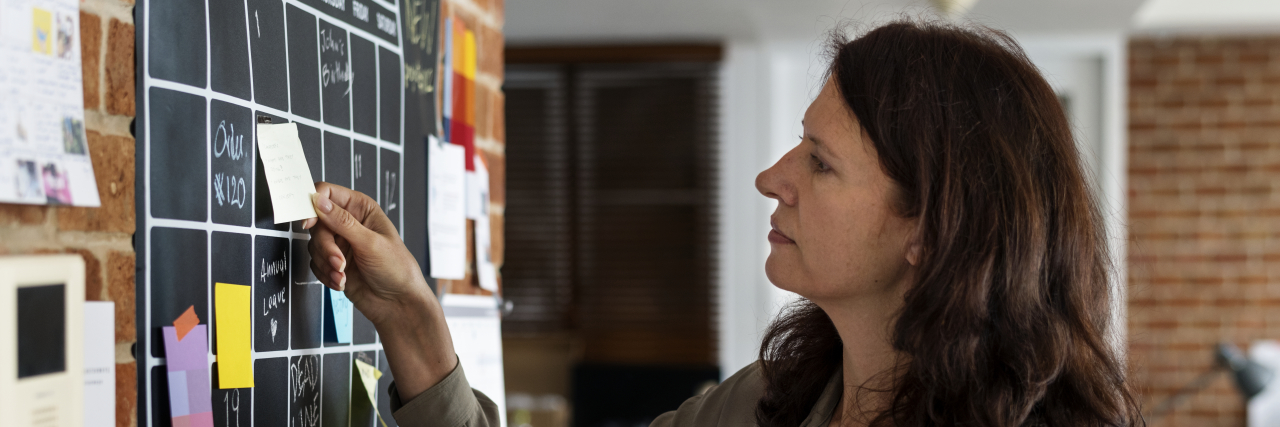6 Questions to Ask Yourself If You're Struggling With Executive Functioning
Editor's Note
Join The Mighty’s Spoonie Life Hacks group to get tips for tackling everyday tasks from people living with chronic illnesses — or to share your own hacks!
I was diagnosed as autistic when I was 22. Among other challenges, I struggle with executive functioning — including organizing, planning, staying focused on tasks and managing daily life. However, I’ve found asking myself a series of questions can often help me find a solution or coping strategy for the problem at hand.
This is not a list of surefire ways to fix your executive function. I’m not sure such a list exists, and, if it does, I don’t have it. This is a list of questions that are helpful to ask when you’re struggling with executive function. Your answers may be different from mine, but hopefully asking these questions helps you figure out how to do things more effectively.
1. Would it be easier to do this thing with music, generic background noise, silence, or something else?
For me, it depends on what I’m trying to do. I need silence or generic background noise to write; I can’t write to music with words. On the other hand, if a task is making me really anxious, I need music with words in order to get over the mental block my anxiety is putting up. I find music makes it easier for me to transition from one task to the next and to start things in general, whereas silence is often helpful once I’m in the middle of something, especially if that thing requires a lot of thinking. If I’m craving silence and can’t get any, classical music is the next-best thing. All of this may be different for you, but it still might be helpful to control your auditory input to the extent you can.
2. Would it be easier to do this in a room by myself, in the vicinity of someone who cares about me, surrounded by strangers, or in some other kind of company?
Writing is typically easiest when I’m by myself, but while I was in college I often found being in a library surrounded by strangers was helpful when I needed to focus on studying. If a task is making me anxious, it’s easiest to do in the company of someone who cares about me, which is why I wrote my first-ever cover letter for a job while at my parents’ house, and I Skyped a friend to write the second one. Again, this might be different for you, but if you can control who you’re with when trying to get something done, that might be helpful.
3. Would it help to have some external accountability, and how can you get that?
One time, when I was really depressed and having trouble doing basic things like brushing my teeth and changing clothes, one of my friends told me to text him a picture of my toothbrush and a selfie of myself wearing actual clothes I could leave the house in.
More recently, I got an app called Habitica, which gives you points when you do things you need to do, like life is a video game. You can set up daily tasks (so you lose points if you don’t do them every day — I have brushing my teeth in this category), habits (so you gain points for doing them but don’t risk losing points on days when you don’t do them — I have laundry in this category), and tasks (one-time things with deadlines, although you don’t lose points for missing deadlines as long as you do them eventually). This sense that something outside my head is telling me to do the thing really helps me do the thing.
4. Can you give yourself a reward for doing the thing, or can you pair an unpleasant task with a pleasant one?
I used to have a dedicated podcast I listened to whenever I did laundry and only when I did laundry. These days, I listen to fun podcasts when I exercise. Sometimes I only let myself engage in a relaxing hobby if I’ve worked toward a long-term goal first. Pairing a pleasant task with an unpleasant one only sometimes works, but it can be great when it’s possible.
5. If you’re getting distracted, can you move the thing that’s distracting you, or move yourself away from it?
I discovered in college that it was a lot easier for me to do schoolwork when I put my phone in my desk drawer. I knew where it was, but it wasn’t in my line of sight, so I was less distracted by it. If you need something more extreme, there are apps and computer programs that lock you out of the internet or certain web pages at certain times. There are obviously scenarios where this isn’t practical, but if you can get distance between yourself and your distraction, it can be really helpful.
6. Have you gotten enough sleep, food, water, alone time, social time, exercise, etc.?
Sometimes it’s not possible to control whether or not you get enough of these things. I’m not here to shame you for that. I’m just going to point out that, if you’re lacking in a lot of these areas, you’re probably not going to be able to focus as easily, and the above tips might not help much.
Again, no one trick is guaranteed to fix everything about your executive function. But hopefully asking these questions can help you find at least one or two brain hacks that make it a little easier for you to get things done.
Getty image by Rawpixel.

